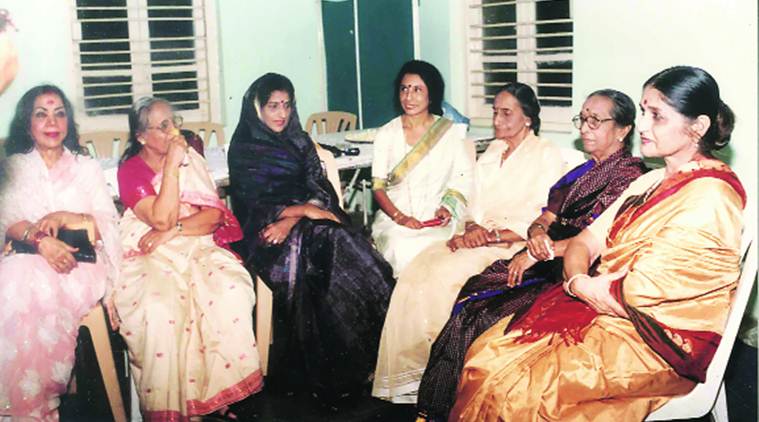Kishori Amonkar passes away: ‘She was constantly experimenting, finding a new canvas, colours’
Hindustani classical music doyen Kishori Amonkar, who died on Monday, leaves behind a rich legacy and a deep void
 IN GREAT COMPANY: (From left) Kathak dancer Sitara Devi, Hindustani classical vocalists Manik Verma, Kishori Amonkar, Prabha Atre, Saraswati Rane, Gangubai Hangal and Mohiniyattam exponent Kanak Rele
IN GREAT COMPANY: (From left) Kathak dancer Sitara Devi, Hindustani classical vocalists Manik Verma, Kishori Amonkar, Prabha Atre, Saraswati Rane, Gangubai Hangal and Mohiniyattam exponent Kanak Rele
Kishori Amonkar’s demise on Monday has created a void that is hard to fill. Musicians like her are born once in a lifetime. My father Wamanrao Sadolikar and Kishori tai’s mother Mogubai Kurdikar were both students of Ustad Alladiya Khan, founder of the Jaipur-Atrauli gharana. I remember once my father was delineating a bandish in Mallkauns for Mogubai and a young Kishori tai was standing in the corner, watching, listening. She picked it up in no time and presented it as it was. After that my father would say, ‘Bahut tez hai aur bahut aage jayegi’. ‘Tez’ meant that she had the capacity to grasp what she heard. But what was more interesting was that she would remember what she learnt, think about it and innovate with it. Which is why she took so many things from so many gharanas and presented it her way. While her mother gave her the khayal gayaki of Jaipur-Atrauli gharana, she also learnt from Anwar Hussain Khan of Agra gharana, Anjanibai Malpekar of Bhendi Bazar gharana and Goa’s stalwart Balkrishnabuwa Parwatkar. She took these interesting things from every gharana and created a ‘Kishori gayaki’. The emotional transcendence in that was always impressive. But if you go looking into the technicalities, they are so hard to grasp because they have been taken from so many places. For her, there was no concept of gharana, only a continuum of notes.
I still remember the first time I heard her. The year was 1960 and the concert was at the auditorium of Chhabildas School in Mumbai’s Dadar. I was 10 and had gone with my father. She was extremely thin back then, with very sharp features. I distinctly remember that long plait dangling to her waist. As a 10-year-old, who’d been learning the basics of ragas, I found her mesmerising. I didn’t know the greatness of those bandishs, because I knew them, but what her vocal chords were doing to the same bandishs intrigued me to the core. The sharp-edged harkats, those spirals of taans, are unforgettable. However, the first time I met her was a decade later, at a music conference in Mumbai. She attended my concert, where I sang a bandish in raga Kedar. She came to me post the concert and said, ‘I thought Jaipur-Atrauli gharana will end with me but I am glad you are doing my mother proud’. Even though, this was 1970 and she was very young then, her saying this mattered, because my heart knew that this was coming from someone so immensely brilliant. It was so interesting how her concerns were notes and not ragas.
I never understood the temper people talk of. I remember that there was a private concert at a common friend’s house and they were hosting a lunch after the concert. ‘She said, no I will not eat. When did I say I wanted to have lunch’. The poor man was stunned. Then she came to me, and said let’s go, I’ll drop you. On our way, she began to ask me about my education. She would say that all the artistes needed to be educated, no artiste should be illiterate. ‘People eat you up otherwise’, was her line. I think at the core of it was the experiences her mother had. Mogubai was iconic but wasn’t treated well by the organisers sometimes. I am glad that Kishori tai was so particular about an artiste’s respect and the conditions he/she was to perform in. A lot of times, she would speak in English so that people took her seriously. She was very particular about the money she charged. Everything was on her terms. She knew how it felt when things were not on one’s terms as they had cost her mother dearly.
She would often speak of wanting to learn from Kesarbai Kerkar and how she didn’t agree to teach her. That hurt her deeply. Sometimes she would add a different element in a raga that one couldn’t imagine was even possible. Performing was like a playground for her, she would constantly experiment, find a new canvas, even new colours. She challenged her audience and critics, and enjoyed it. A simple person, I have never seen her wearing heavy jewellery or heavy saris. She never wanted anything to distract the audience from her sadhana. It’s heartbreaking today, to lose someone like her. There will never be another Kishori Amonkar. What she leaves behind is a treasure trove of her music that will be remembered for times to come.
- 01
- 02
- 03
- 04
- 05



























